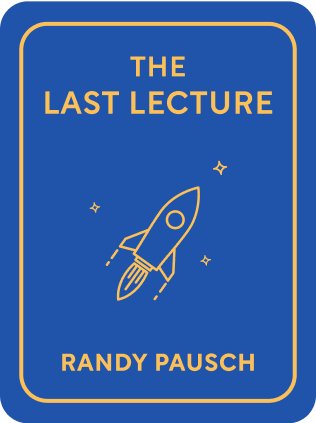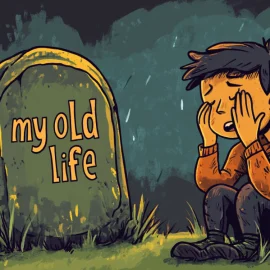

This article is an excerpt from the Shortform book guide to "The Last Lecture" by Randy Pausch. Shortform has the world's best summaries and analyses of books you should be reading.
Like this article? Sign up for a free trial here .
Do you want to know what the six lessons from The Last Lecture are? How can you implement them into your own life?
Randy Pausch used his Last Lecture to recount lessons he had learned or taught throughout his life. The Last Lecture lessons include: the value of honest feedback, people before material things, humility, rising to the occasion, breaking down brick walls, and accepting reality.
Keep reading to learn about the six The Last Lecture lessons.
The Last Lecture: Lessons Learned
In summer 2006, Randy Pausch experienced pain in his upper abdomen, followed by jaundice. He at first thought he had hepatitis, but CT scans showed a tumor on his pancreas. Of all cancers, pancreatic cancer is the most deadly; half of those who get it die within six months of diagnosis and 96% die within five years.
Pausch approached his treatment like a scientist, asking questions and seeking data. His goal was to live as long as possible for his family and to that end, he was willing to endure any potentially effective treatment, no matter how miserable it made him. He underwent a complicated surgery called a “Whipple” procedure, which removed his gallbladder and part of his pancreas, stomach, and small intestine. This was followed by chemotherapy and radiation. He lost 44 pounds from the brutal regimen, but scans in January showed no additional signs of cancer.
However, tests seven months later in August 2007 showed that the cancer had metastasized to his liver. Pausch and his wife learned the bad news from looking at his charts on the doctor’s computer while waiting for his appointment. The next step was palliative treatment (more chemo) to ease his symptoms to improve his quality of life and possibly extend his life by a few months.
When Pausch asked how long he had to live, the doctor said he probably had three to six months of good health. The positive spin reminded Pausch of the way Disney employees are taught to respond when people ask when the park closes: “The park is open until 8 p.m.”
The day before the checkup, Pausch had told his wife Jai that regardless of the test results, for the moment, it felt great to be alive and be with her. That’s how he decided to live the rest of his life—focusing on the moment.
Sometime later, a Carnegie Mellon colleague told him she’d seen a man driving a convertible while listening to music. His arm hung out the window, he was tapping the song’s rhythm on the side of the car, and he had a smile on his face. She was surprised to realize it was Pausch, so obviously living in the moment.
Earlier Life Lessons
Besides the hard lessons of his diagnosis, Pausch used his Last Lecture to recount other lessons he had learned or taught throughout his life. The Last Lecture lessons included:
The Value of Honest Feedback
Pausch could be arrogant and tactless, but on two memorable occasions, others put him in his place. The first was his sister Tammy, when he was seven and she was nine. As they waited at the school bus stop one morning, he was being bossy and obnoxious, so she tossed his lunch box into a puddle just as the bus came. She was sent to the principal’s office, and the principal decided to let their mother handle it. She, in turn, deferred to their father. Their dad listened to the story with a smile and all but congratulated Tammy for putting her brother in his place.
Later, a faculty member and mentor at Brown University, where Pausch was an undergraduate, told him it was a shame that people found him arrogant because it would hold him back in the future; Pausch concluded that he’d just been tactfully told he was a jerk.
He came to appreciate those in his life who gave him honest feedback and he tried to do the same for his students.
People Over Things
The second of The Last Lecture lessons was that people are more valuable than materialistic possessions. Before he was married, Pausch enjoyed being an uncle to his sister’s two children. He took the role seriously, trying to teach them life lessons and new ways of thinking. He had two rules for their outings: don’t whine and don’t tell mom what they’d done with their uncle.
Once, when the kids were seven and nine, he picked them up in his new convertible. As they climbed in, their mother warned them not to get it dirty. Hearing this, Pausch calmly opened a can of soda and poured it onto the cloth-covered back seats. His message was that a car is just a possession—and people are more important than materialistic possessions. Later that weekend, when his nephew got the flu and threw up on the car seat, Pausch was glad he’d delivered that message.
After he got married, he passed the same message along to Jai. She’d backed out of their garage in their minivan and struck his convertible. She put both vehicles in the garage, cooked his favorite meal, and with trepidation, told him what had happened. She explained that both vehicles still ran but that the convertible had the most damage.
First, Pausch said, let’s finish dinner. Later, as they looked at the vehicles, Jai said she’d get repair estimates in the morning. Pausch replied that since the vehicles still worked, there wasn’t any need to fix the dents. They were just materialistic possessions, with a utilitarian purpose, like garbage cans and wheelbarrows—you don’t fix those when they get dented. In life and marriage, not everything needs to be fixed. Sometimes it’s better to let small things go.
The Meaning of Humility
After his father died in 2006, Pausch began looking through his father’s papers. He found photos of his father as a young man playing an accordion, wearing a Santa suit, and holding a giant stuffed animal. Among the documents relating to his charity work and his business was a 1945 Army citation from the commanding general of the 75th Infantry Division for heroism.
When his infantry company was attacked by German forces, eight men were wounded, and Pausch’s father, a 22-year-old medic, braved enemy fire to treat the men, all of whom were later evacuated. Though he received the Bronze Star for valor, he never mentioned it to his son.
For Pausch, it was yet another lesson from his father, this time weeks after his death, about sacrifice and humility.
You Can Rise to the Occasion
On New Year’s Eve as Pausch and his seven-months-pregnant wife were about to ring in 2002, she began hemorrhaging and they rushed to the hospital. Her placenta had torn away from the uterine wall, endangering the baby, and she was going into clinical shock. They were both terrified, but the anesthesiologist took Pausch aside and told him to do everything possible to keep Jai calm as they performed a caesarian section.
Pausch managed to do so by reassuring her and calmly describing everything that was happening. Their son Dylan weighed just two pounds, fifteen ounces, but was able to breathe on his own and cry. The lesson was that even when the situation is dire, there are always things you can do to make it better.
Brick Walls
The fifth of The Last Lecture lessons was about overcoming obstacles. Pausch had learned to overcome obstacles in his academic career—for instance, talking his way into a temporary job with Disney. He’d come to believe and told his students that when you run into brick walls, they’re an opportunity for you to demonstrate how badly you want something.
But at age 37, he encountered one of his most formidable challenges—winning over the woman who eventually became his wife. He met Jai at the University of North Carolina at Chapel Hill, when he was invited to give a lecture. She was a graduate student in comparative literature but was also working part-time hosting visitors to the computer science labs. She’d once heard him speak and was intrigued, so she researched his background when she learned he’d be visiting UNC. Pausch was smitten with her and they went out a few times during his visit. When he returned to Pittsburgh, he asked her to visit him. She refused, not wanting a long-distance relationship, but he persisted and they began seeing each other regularly.
But when Pausch asked her to move to Pittsburgh and live with him, Jai refused. However, she agreed to move and live in her own apartment. When he went to UNC to help her pack, she changed her mind, saying she didn’t love him. Pausch was distraught and called his parents for advice; they told him to be supportive and give her time. She eventually realized she loved him after all, and moved to Pittsburgh. He’d shown how badly he wanted the relationship by not letting the brick wall of her refusals stop him.
No Fairy Tale Endings
Their marriage began memorably—the ceremony took place at a Victorian mansion and they departed in a hot air balloon. But the balloon went off course and had to crash-land in a field, close to an oncoming train. Fortunately, no one was hurt. They survived the scare, although a more formidable one, Pausch’s cancer diagnosis, came later.
Like all couples, they had to learn to communicate, which was an ongoing process. By the time Pausch was diagnosed with cancer eight years into their marriage, Jai had learned to be honest and direct. Because he was a scientist, she also gave him data. For instance, after his diagnosis, he wanted to visit his side of the family for Christmas, but they had the flu, and Jai didn’t want him or their children to risk exposure. So she sought input from two neighbors who were doctors—they advised against exposing the kids but said Pausch could go. When Jai presented him with this form of “data,” Pausch agreed to make a quick visit by himself.
After his diagnosis, Jai also learned to let go of small frustrations, such as Pausch’s habit of not putting things away and leaving his clothes strewn around. She kept a journal in which she recorded her frustrations, rather than arguing or letting them detract from their remaining time together. They tried to focus on living each moment.
New Year’s Eve was particularly emotional. Pausch took his son Dylan to the movie, Mr. Magorium’s Wonder Emporium, which was about a toymaker. When it was revealed that the title character was dying, Dylan sat on his father’s lap and cried, although he didn’t know his father was dying too. A poignant line from the movie stuck with Pausch. When an apprentice tells Mr. Magorium that he can’t die but has to live, he responds that he’s already done his living.
Pausch and his wife reviewed the positives of the past year: vacations together and time spent with their children. Pausch resolved to start picking up his possessions when he saw her writing in her journal.
Randy Pausch delivered The Last Lecture lessons in hopes of leaving guidance for his children to follow when they got older and to share what he learned with the rest of the world. He made sure his legacy will live on.

———End of Preview———
Like what you just read? Read the rest of the world's best book summary and analysis of Randy Pausch's "The Last Lecture" at Shortform .
Here's what you'll find in our full The Last Lecture summary :
- What Randy Pausch's philosophy of life was
- How a professor with only months to live recounted his life's experiences and lessons
- How a computer science professor ended up on a secret project with Disney






